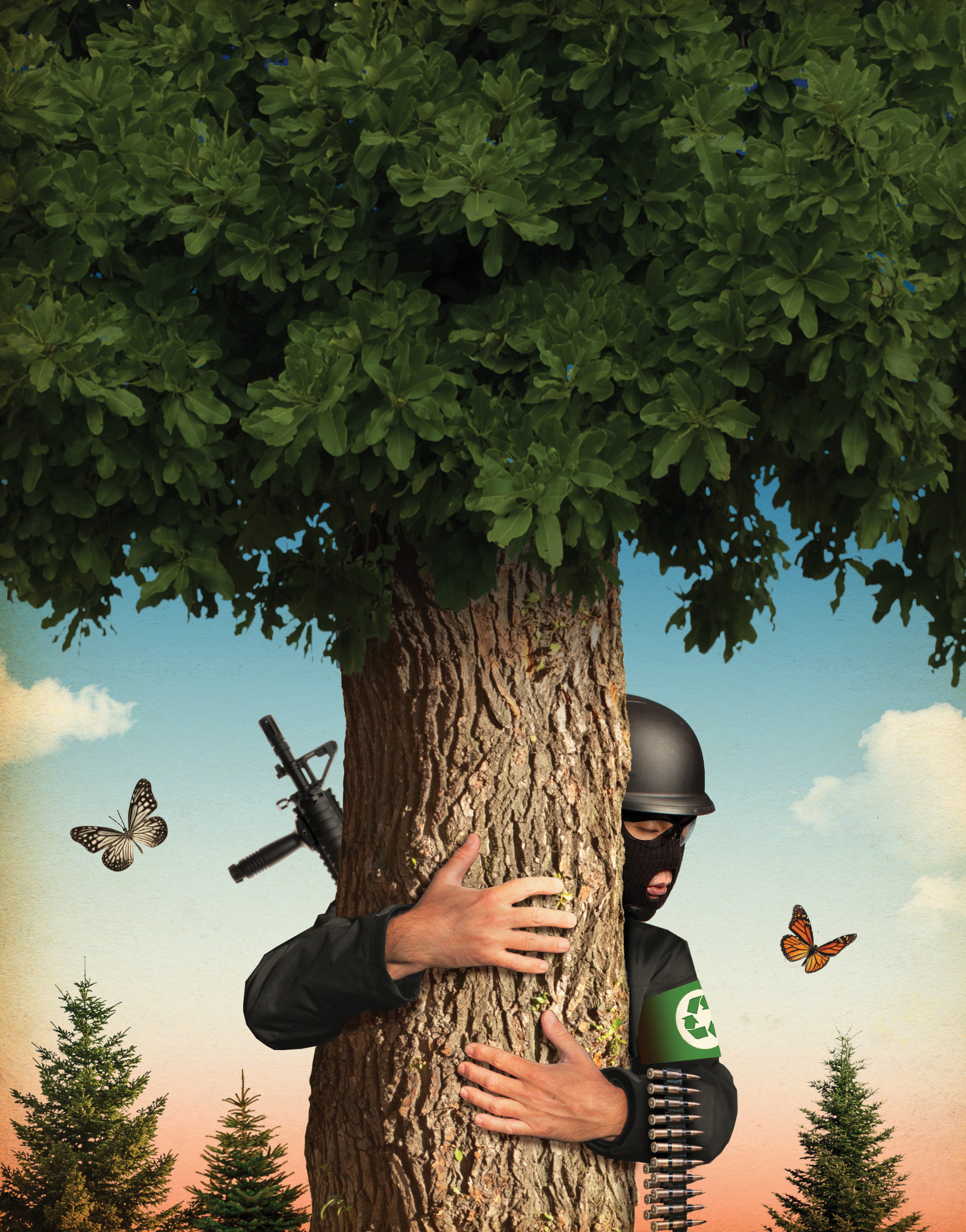Through his research on eco-fascism, Joseph Henderson ’03 explores how environmentalism can be co-opted by the far right — and how to take it back.
When a white nationalist killed 10 people at a grocery store in Buffalo, N.Y., this past spring, he released a manifesto justifying his horrendous acts by relying on the “great replacement,” a conspiracy theory charging that whites are deliberately being replaced with non-white immigrants. While such a belief would seem to be straight-up racism, the manifesto went on to cite an unexpected ideology as the root of his actions: environmentalism. “The protection and preservation of these lands,” he wrote, “is of the same importance as the protection and preservation of our own ideals and beliefs.”
Those words were lifted from the shooter of two mosques in Christchurch, New Zealand, in 2019 and cited by other violent attackers such as the gunman who killed 23 people at a Walmart in El Paso that same year. According to Joe Henderson ’03, those sentiments represent a dangerous strain in the politics of the far right: eco-fascism. “There is no single kind of environmentalism; there are lots of different kinds of environmentalism,” says Henderson, an associate professor of social sciences in the environment and society department at Paul Smith’s College. “Research shows when you hit people with ‘gloom and doom’ scenarios, people tend to radicalize, and sometimes they radicalize in a bad way, looking around for a kind of authoritarian to make things orderly again.”
Henderson was first alerted to the movement while teaching one of his classes. In response to an assignment on solutions to climate change, a white student proposed genocide of non-white people. Environmentalism is typically viewed as a movement on the left, pushing regulations to preserve clean air and water or protect endangered species. Eco-fascists, by contrast, tend to view humans as a sort of virus on the planet, and just as environmentalists push to root out invasive plant species, eco-fascists attack immigrants and foreigners as invaders who must be kept out or eliminated to reduce stress on the natural landscape. While the ideology is a fringe movement, it has roots in thinkers such as Madison Grant, an early 20th-century godfather of conservationism who also preached eugenics and the purity of the Nordic race.
Henderson gave a talk at Syracuse University on the topic this past fall and is currently working on a paper about how climate education both contributes to the problem and could potentially provide a solution.
“Environmental issues are about power dynamics: who is allowed to use land for what purposes, who controls the flow and use of resources, whose ideas shape environmental policies.”
Joe Henderson ’03
Henderson comes to environmentalism from the perspective of growing up working poor in the rural town of Chipmunk, N.Y., near the Pennsylvania border, where he spent much of his childhood idyllically roaming through the woods — but also saw the environmental degradation wrought by the oil industry in the area. “I would go swimming in creeks that would change my swimsuit different colors and lay in my bed at night smelling oil from wells across the street,” he says. Coming to Colgate on scholarship, he was both grateful for the opportunity, but also sometimes felt like a fish out of water among wealthier classmates.
He majored in environmental geology under the mentorship of the late Professor Bruce Selleck ’71, who also grew up working class and “took me under his wing.” After graduation, Henderson earned a PhD at the University of Rochester. He wrote his dissertation critiquing wealthy liberals who practiced environmentalism by focusing on consumption of sustainable products rather than addressing the systemic injustices that produce environmental inequalities. “Environmental issues are about power dynamics: who is allowed to use land for what purposes, who controls the flow and use of resources, whose ideas shape environmental policies,” he says.
In another recent paper, titled “What is climate change education in Trump country?” he argues that without engaging the fundamental cultural and political beliefs of a person, they are likely to just adapt the science to their existing ideology. “There is this problematic assumption in climate change education that if we just teach kids about nature and climate, they’ll make the world a better place,” Henderson says. “I find that incredibly blinkered.”
By contrast, an “anti-fascist” climate education would focus not on gloom-and-doom predictions of climate change or superficial consumer fixes, but on exploring capitalist and colonialist roots of environmental inequities. “It’s not just about saying that burning carbon is making the planet warmer — it’s about saying what type of carbon, where it is being extracted, and what the implications of that are,” he says. “Whether it’s a kid from rural Oklahoma or a kid from inner-city Brooklyn, a climate justice approach can connect people across cultural, political, and geographic differences.”

